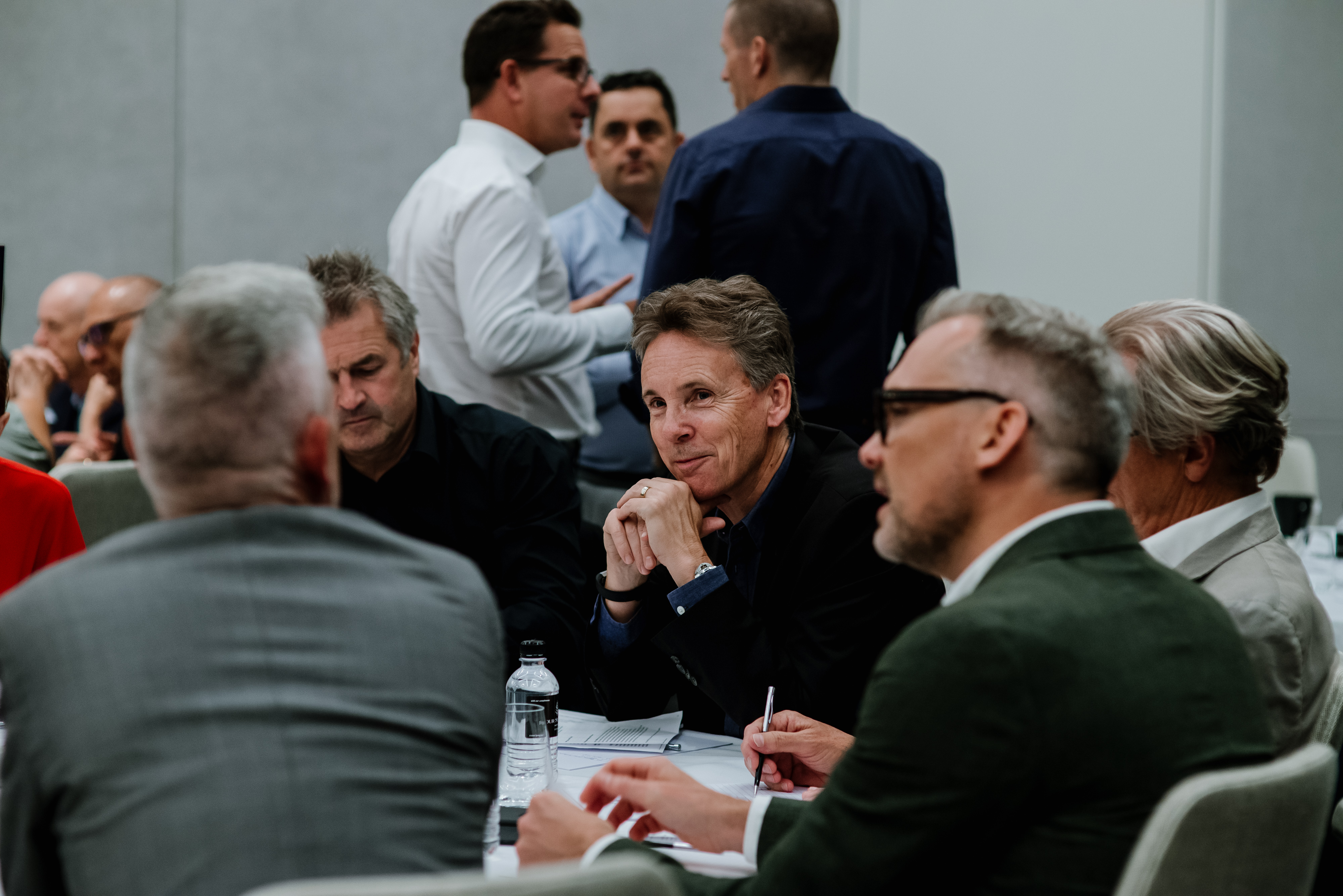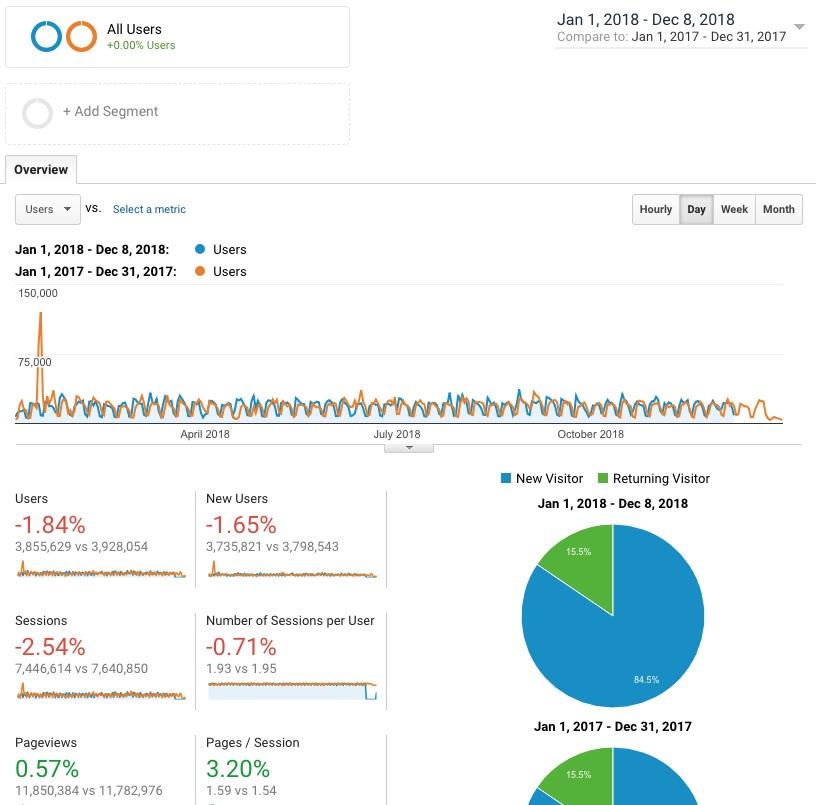Mumbrella is ten: Tailwinds and headwinds
On Mumbrella’s tenth birthday, founder Tim Burrowes looks back on the year we got new management.
As regular readers will know, on December 9 each year, I’ve been in the habit of posting a piece reflecting on Mumbrella’s milestones and millstones for the year.
Last year, our ninth birthday, was no exception.
In the early days, the focus of the piece was often about traffic, as we began to build an audience, then our adventures in building a business model, launching events and creating a presence beyond Sydney.
You can read previous efforts here:
- Our first post: Welcome to Mumbrella
- Year two: Mumbrella is two
- Year three: Mumbrella is three – thanks for supporting us
- Year four: Mumbrella is four (and a bit)
- Year five: Why I’m stepping down as Mumbrella editor to help grow the business
- Year six: Mumbrella is six – now we’ve got a history
- Year eight: Mumbrella is eight: Beating the burnout
- Year nine: Mumbrella is nine – We’ve joined the two commas club
This time last year though, I had a problem.
I couldn’t write about the thing that was occupying most of my waking thoughts, and affecting my sleep.
We were in the final stages of selling Mumbrella.
The original plan was to time the announcement around my annual piece. But these things take longer than you’d think, so we got to the last working day before Christmas until we finally got to share news of the sale.
Looking back now, I realise the process was more stressful than the transition that followed.
As a result of the sale, the single most common question I was asked during 2018 was a variation of “So how’s life changed?”
I lost count of how many times I’ve been asked, but it would be in the dozens.
It was always flattering to be asked, because it meant that people had noticed our announcement, and always seemed happy for us. But my answer also became a bit of a script.
So to answer that question: Every year at Mumbrella is different, and this year’s big changes haven’t been as a result of the sale.
To begin with, I was slightly hesitant in how I answered the follow-up question about the new owner: What are they like?
I’ve come across plenty of acquisitions that don’t work, or where the founders are miserable. So I was a bit nervous of sounding naive with my answer.
As weeks became months, it began to shift slightly. I stopped telling people that the team at our new owner Diversified Communications seemed nice. A year in, I think the evidence is mounting that they actually are nice.
One of the conditions of sale was that there’d be no interference in editorial decisions. And they haven’t, not once.
Based on the cautionary tales of people who sold their companies and regretted it, we’ve been fortunate in our choice of partner.
A year on, I’ve never regretted selling.
We’ve found ourselves working with people who ask questions about investment, not cost cutting. And long term growth, not the next quarter. As you may recall, Diversified, which is US-based, is family-owned, and takes a long term view.
The challenges have been practical rather than philosophical. We’ve had the adjustments of moving to shared accounting systems and a move from the Australian financial year to a US calendar year.
And we’ve found ourselves within a company that is serious – to be brutally honest, more serious than we were – about what it takes to build a culture. How do you grow from a couple of founders calling the shots to having a real management team?
This year, we’ve invested in workshops to build the strength of Mumbrella’s management team. At some point in that process, we stopped calling it the management team and started calling it the leadership team.
And myself and our CEO Martin Lane are receiving some one-on-one leadership coaching too. My first session is tomorrow, as it happens.
I’ve also spent an increasing amount of time thinking about how to scale Mumbrella while keeping it true to its essence, whatever that is.
How do we ensure that the Singapore-based reader of Mumbrella Asia has the same expectations as the Melbournian reading Mumbrella Australia? Or in the future, the Londoner, or New Yorker, for example.
I don’t think the answer can be to spend more and more time on planes, although admittedly I have this year.
Much of my thinking about that was informed by a chat to PHD Media’s APAC head of strategy Chris Stephenson.
How do you create a consistent product when you can’t be everywhere at once? Productise, systematise, commercialise, is the approach PHD has taken globally. Define your product, build systems behind it, and then let that drive the business model.
It’s a long way from that simple little WordPress blog I was noodling around with on December 9 2008. I worry that the tone of this year’s update must feel less the romantic underdog’s tale and more a middle management shopping list.
But pragmatically, it’s what we need to figure out next.
And actually, we’ve not done a bad job of putting it into practice with the events side of the business, which is probably what made us sellable in the first place.
Tony Faure, who among other things is the chairman of Ooh Media, used to act as an adviser to Martin and I. His mantra of repeatable processes drove us a long way in that direction. (He’s also the man who nagged us into finally getting a redesign, and restarting our podcast.)
But this was the year I realised we were further behind on systematising the editorial side of things – and that was on me. It sounds a bit dull thinking like that, but it’s part of the behind-the-scenes hard work that we need to do.
That means trying to put into words where previously I leaned on instinct. When we first launched in Asia five years ago, our deputy editor Robin Hicks moved to Hong Kong, then Singapore, carrying the Mumbrella DNA with him.
But what do you do for the next generation? It’s the same thing that agencies struggle with when they open a second office, and try to offer a consistent product.
In October, Ravi Balakrishnan joined us as editor of Mumbrella Asia. He was previously editor of Brand Equity – the marketing magazine of The Economic Times, India’s most-read daily financial newspaper.
So I’ve been trying to be more disciplined in defining what I think Mumbrella is.
Poor old Ravi found himself subject to a two hour PowerPoint presentation when we first met in Singapore.
Some of it is about restating our philosophy externally too. We’ve been guilty of sometimes failing to challenge rivals who position themselves to the industry as the goodies, because they don’t write bad news, even when it might be called for.
Last week our agencies writer Abby Dawson had passed along to me feedback from the boss of a media agency she’d had coffee with. He felt Mumbrella’s view on the industry was a cynical one; she argued we tried to be a critical friend. We should explain that, he suggested.
When it comes to reputation, perceptions are reality. So it was useful feedback that we need to be better at explaining ourselves. I tried to articulate it in my welcome speech at the Mumbrella Next Awards on Thursday night:
We aim to be a critical friend of the industry. I chatted to an agency boss a while back, and the advice he gave me resonated: ‘We know what you’re against, how about telling what you’re for?’.
Which is good advice. We’re for a better industry for everyone. We like the industry we’re in, and we want it to be as good as it possibly can be.
Sometimes that means calling out bad behaviour. We’ll always do our best to tell it like it is to our readers. You might sometimes disagree with our point of view, but it’s always a point of view sincerely held.
And our priority over the coming years will be to do more than ever to celebrate the achievements and positives about this fantastic industry.”
One experience this year helps sum up our sometimes complex relationship with our industry.
Our coverage of the Atomic 212 awards saga was published almost exactly a year ago. We spent three months investigating several untrue claims made by the agency’s then CEO Jason Dooris on the path to winning a string of industry awards.
The feedback we got from most quarters was that this investigation had been in the best interests of the industry.
But there was also an unintended consequence. The Media Federation of Australia – the voice of most of Australia’s big media agencies – decided to declare a one year moratorium on entering local awards
Entries for The Mumbrella Awards were among those that took a hit, which felt harsh at the time. But it’s a business, and nobody is entitled to have the market support their model if it doesn’t choose to.
Hopefully we’ll successfully make the case that cleanly run awards with strong jury processes are worth supporting.
We also faced another headwind. We found ourselves involved in a couple of legal cases, which I’m not in a position to talk about. Suffice to say, recent articles from both News Corp and Fairfax Media about a need to reform libel laws struck a chord. As a publisher, even if you don’t lose, you can find yourself caught up in a costly and time consuming process if you want to stand your ground over what you’ve published.
One other commercial challenge we faced was the launch of a new competitor event in Sydney, Advertising Week. That moved some sponsorship dollars away from our Mumbrella360 conference.
But again, we’re not automatically entitled to those dollars. The market does what the market chooses. And it’s our job to demonstrate to sponsors that we can give them the best return on their investment.
One advantage we’ve always had over competitors, whether in publishing or events, is that everything we do is audited. You can see all our numbers for event attendance and site traffic on the Audited Media Association of Australia website.
And in my day job, it was a terrific year. Recording the Mumbrellcast, driven by our deputy editor Josie Tutty, has become my favourite part of the week. I couldn’t be happier that we brought it back.
It’s a matter of some pride that the Mumbrellcast now has well over 4,000 subscribers. And a matter of even more pride when I listen to our (mostly) young editorial team speak with such authority and passion about our industry.
You may recall that I usually share our turnover and profit numbers in this annual update. That no longer feels like my information to share in quite so much detail. Suffice to say we grew again.
But I will share an update on our traffic.
It looks like it will be a record breaking year.
While our audited numbers are available from the Audited Media Association of Australia website as usual, I’ll use our Google Analytics numbers because the graphs are prettier.
The main way we keep score among the editorial team is page impressions.
Based on our internal Google Analytics, on Thursday we overtook the number of page impressions we delivered last year of 11,782,976.
And some time over the next few days we should overtake our annual record of 12,045,065 page impressions which we hit in 2016.
Since Mumbrella began (and we configured Google Analytics a few weeks later), we’ve had around 95m page impressions.
Meanwhile, we’re already thinking about 2019.
We’ll be spending a lot of time contemplating how we grow the membership model we created with The Source.
If you’re unfamiliar, The Source is our subscription offering which tracks, among other things, which brands work with which agencies.
We gave it a bit of a polish this year, so that it now looks like a proper part of the Mumbrella family, but there’s still a lot more to be done with it.
My instinct is that the hard work from many publishers in asking readers to pay for premium content is beginning to work. We saw The Guardian hit its milestone of a million readers.
We’ll be investing time and money in developing that side of the business.
I suspect I’ll also spend even less time at the newsdesk coalface in 2019. Here in Australia, the editorial team doesn’t really need me for that. As anyone who listens to the Mumbrellacast could tell you, they know what they’re talking about.
Meanwhile though, these annual pieces always end the same way. Let me quote myself from Thursday night’s speech one more time:
It all worked out. And in large part, that’s thanks to a lot of the people in this room.
So, I need to say a few thank yous. The terrific thing about thinking about the last ten years is realising just how many people in the industry have supported us in getting where we’ve got.
That’s been in so many ways – speaking at our events, writing for us, through sponsorship and advertising.
A lot of people here have been kind enough to give me advice over the years. It’s always been appreciated.
And I’m delighted that so many former members of staff have joined us tonight too. We owe so much to them, along with our current wonderful team.
Thanks for reading and supporting us.







Happy Birthday Mumbrella and congrats Tim on a great and informative newsletter. I’ve been getting my daily dose of the ‘brella since day one. Love it!!